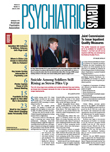Suicides among active U.S. Army soldiers increased for the second straight year, as 117 soldiers killed themselves in 2007, according to a report released on May 29.
There were 934 nonfatal suicide attempts. The numbers of suicides and attempts were the highest in recent years. In 2006, 102 soldiers took their own lives.
Of those who died by suicide in 2007, 29 killed themselves during service in Iraq and four while in Afghanistan.
The increase comes at a time when the Army is recruiting more mental health professionals, conducting Army-wide training programs to fight the stigma surrounding mental health issues, and beginning to integrate screening and treatment for posttraumatic stress disorder (PTSD) and depression into primary care settings.
“I am saddened and frustrated that the number of suicides hasn't declined,” said psychiatrist Col. Elspeth Cameron Ritchie, M.C., director of behavioral health in the Army Surgeon General's office, in an interview with Psychiatric News. But many of the Army's interventions were too recent to show any effect on the 2007 figures, she said.
Similar demographic factors characterized suicidal behavior in both 2006 and 2007, according to the Army Suicide Event Report. The Army requires a formal report on any suicidal behavior that results in a soldier's hospitalization, evacuation, or death.
Demographically, soldiers who completed or attempted suicide were most likely to be young, Caucasian, and in the lower enlisted ranks. About 95 percent of those completing suicide were men, while 27 percent of those attempting suicide were women—about twice their proportion in the Army overall.
Use of firearms, military or nonmilitary, accounted for 63 percent of deaths, while overdoses (60 percent) and cutting (19 percent) were the prime methods for those attempting suicide. Most attempts and completed suicides occurred at the soldier's personal residence.
Suicide rates (19.5 per 100,000) adjusted for gender and age are roughly comparable to civilian rates, but both protective and risk factors are different enough that comparisons are not useful, said Ritchie.
“They are both more resilient and more vulnerable,” Ritchie noted. “Soldiers are prescreened and get all their health care free, but also have access to lethal weapons and face the stresses of war.”
A recently failed intimate or spousal relationship was again the most common association with completed or attempted suicide, according to the report. However, being married was slightly protective for completed suicides but less so for attempts while in the two war zones.
About 44 percent of those who completed suicides and 55 percent of those who attempted suicide also had a history of at least one diagnosed mental disorder, mainly mood or anxiety disorders, or substance abuse.
Soldiers who had served at least once in Iraq or Afghanistan accounted for 61 percent of completions (n=66) and 33 percent of attempts (n=304). Only eight soldiers who completed suicide and 64 who made attempts were reported to have histories of multiple deployments to the two war zones. The report did not compare suicides with a history of combat injury, said Ritchie.
Many factors commonly associated with deployment could not be associated with the suicides assessed in this study. PTSD was diagnosed in only seven completed cases, and direct combat experience in 26—although this latter information was unavailable in over one-third of cases.
A recent study by Army researchers found that rates of mental health problems six months after soldiers returned from war was higher among Reserve or National Guard troops than among regular active-duty soldiers. However, the 2007 Army suicide report found that members of the Reserve or National Guard were less likely to commit suicide than their regular Army peers.
The Army's Battlemind program, which prepares troops for the psychological stresses of deployment, combat, and return home, and prepares their families for separation, proved protective against those stresses, according to last fall's Mental Health Advisory Report-V (Psychiatric News, April 4). While Battlemind is not specifically an antisuicide program, the Army had no data on whether soldiers who had taken the training (usually on a unit basis) were less likely to commit suicide.
The Army's various interventions may eventually bear fruit in terms of reducing suicidal behavior, but there is no panacea that will prevent suicide in the service, said Ritchie.
“We don't know what the numbers would be without these programs,” she pointed out. “But the current high level of operations tempo will persist, and there is no guarantee that the suicide rate will go down.”

